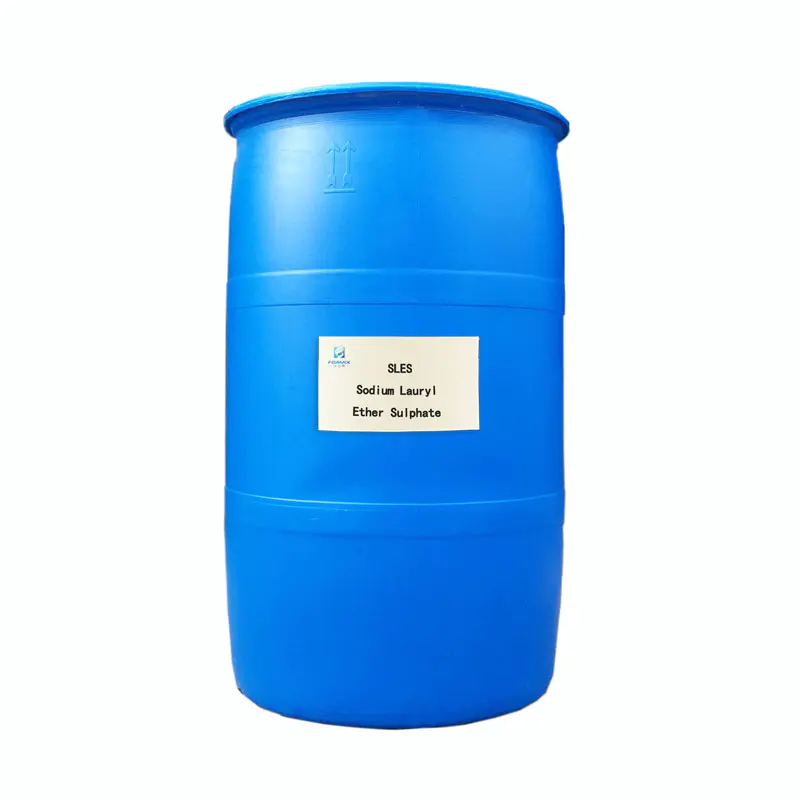Anionic Surfactants: The Key to Effective Cleaning and Industrial Applications
2025-02-11
Anionic surfactants are one of the most commonly used classes of surfactants in various industries. Their ability to reduce surface tension between liquids and solids makes them indispensable in everything from household cleaning products to industrial applications. Whether it's detergents, shampoos, or emulsifiers, these versatile compounds play a vital role in enhancing the performance of numerous products we use daily. But what exactly are anionic surfactants, and why are they so widely employed?
What Are Anionic Surfactants?
Surfactants, or surface-active agents, are chemicals that lower the surface tension between two substances, such as liquids and solids, or between different liquids. Anionic surfactants specifically carry a negative charge on their hydrophilic (water-attracting) head, which makes them excellent at attracting positively charged particles, such as dirt, grease, and oil. This charge enables them to break up oils and dirt, making them easier to wash away with water.

Unlike other types of surfactants (like nonionic or cationic surfactants), anionic surfactants are characterized by their ability to form strong negative charges that allow for superior cleaning action. This makes them particularly effective in cleaning and emulsifying oils and greases.
Common Types of Anionic Surfactants
Anionic surfactants come in various forms, depending on the specific application. Some of the most common types include:
- Sodium Lauryl Sulfate (SLS): Perhaps the most well-known anionic surfactant, SLS is widely used in personal care products such as shampoos, body washes, and toothpaste. It's highly effective at foaming and cleansing.
- Linear Alkylbenzene Sulfonate (LABS): LABS are commonly found in household detergents and industrial cleaners. Their ability to remove dirt and stains efficiently makes them ideal for laundry detergents and automatic dishwashing products.
- Sodium Coco-Sulfate: Derived from coconut oil, this surfactant is often used in shampoos and body washes. It’s a milder alternative to sodium lauryl sulfate and is often marketed as being gentler on the skin.
- Fatty Alcohol Sulfates: Used in industrial applications, these surfactants can emulsify oils and remove heavy soil and grime from surfaces.
Why Are Anionic Surfactants So Popular?
Anionic surfactants offer a host of benefits that make them the go-to choice in many formulations:
1. Powerful Cleaning Action: The negative charge of anionic surfactants allows them to effectively attract and remove dirt, oil, and grease. This makes them ideal for household cleaning products and industrial degreasers.
2. Foaming Capability: Anionic surfactants are often used in products that require foam formation, such as shampoos, soaps, and cleaning agents. The foamy lather is not only visually appealing but also aids in the dispersion of the surfactant across surfaces.
3. Versatility: From personal care products to laundry detergents, industrial cleaners, and even agricultural formulations, anionic surfactants are incredibly versatile. They can be used in a wide range of formulations, making them valuable in both consumer and industrial products.
4. Cost-Effectiveness: Compared to other types of surfactants, anionic surfactants are relatively inexpensive to produce, making them affordable for large-scale applications in both consumer goods and industrial processes.
Applications of Anionic Surfactants
Anionic surfactants are used in many sectors, including:
- Personal Care: Shampoos, soaps, body washes, toothpaste, and bubble baths often rely on anionic surfactants for their cleaning and foaming properties. They break down oils and help remove dirt from the skin and hair.
- Household Cleaning: Laundry detergents, dishwashing liquids, surface cleaners, and floor cleaners use anionic surfactants to emulsify grease and lift dirt from surfaces.
- Industrial Cleaning: In industries such as automotive, food processing, and manufacturing, anionic surfactants are used in heavy-duty degreasers and industrial cleaning solutions. They are also used in the formulation of emulsifiers for paints and coatings.
- Agriculture: Anionic surfactants are included in pesticide formulations to help spread the active ingredients evenly across surfaces and improve their efficacy.
- Oil and Gas Industry: In oil recovery, anionic surfactants are used to help release trapped oil from underground reservoirs, improving the efficiency of oil extraction.
Environmental Impact and Safety Considerations
While anionic surfactants are highly effective, their environmental impact can be a concern. Some anionic surfactants, especially those derived from petrochemicals, may not break down easily in the environment, contributing to water pollution. This has led to the development of more eco-friendly alternatives, such as surfactants derived from renewable sources like coconut oil and palm kernel oil.
It’s essential for manufacturers to choose surfactants that balance cleaning power with biodegradability. Many companies are now opting for sulfate-free or biodegradable anionic surfactants to address environmental concerns.
Conclusion
Anionic surfactants are essential ingredients in many everyday products, providing powerful cleaning action and effective dirt removal. Whether used in personal care products, household cleaners, or industrial formulations, their ability to emulsify oils and dirt makes them invaluable in both consumer and industrial applications. As with all chemicals, it’s important to be mindful of their environmental impact, and the industry continues to evolve to find more sustainable options. Nevertheless, the widespread use and benefits of anionic surfactants in the modern world cannot be overstated—they are truly a cornerstone of cleaning and industrial chemistry.
Qingdao BAETY New Materials Co., Ltd. is a leading supplier of high-quality chemical products in China. Our main products include Nonyl Phenol, Nonyl Phenol Ethoxylates, Lauryl Alcohol Ethoxylates, Defoamers, AES(SLES), Alkyl Polyglycoside/APG, etc.
Visit our website at https://www.btchemicals.com/ to learn more about our products. For inquiries, you can reach us at sale@btchemicals.com.

